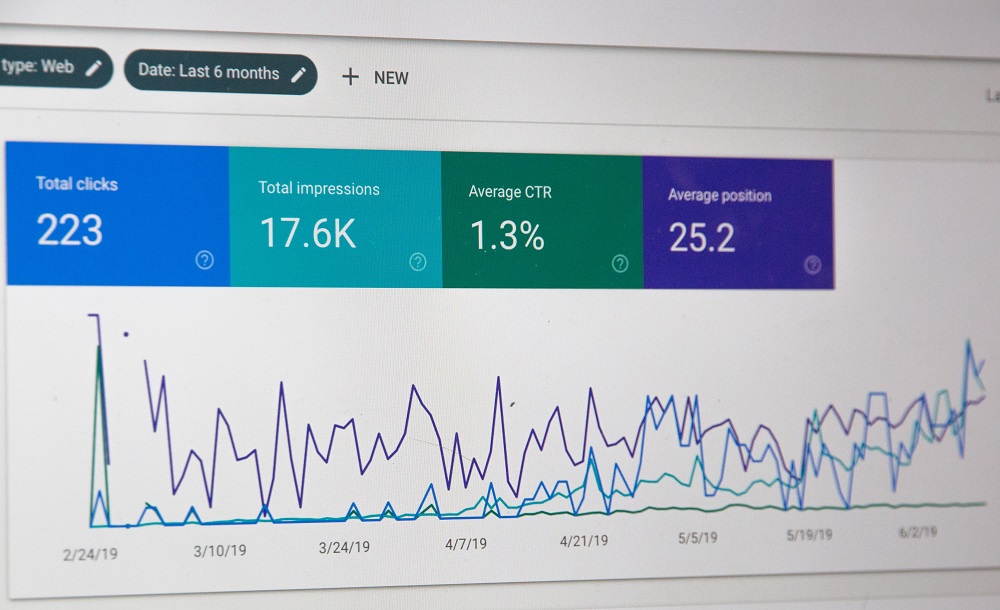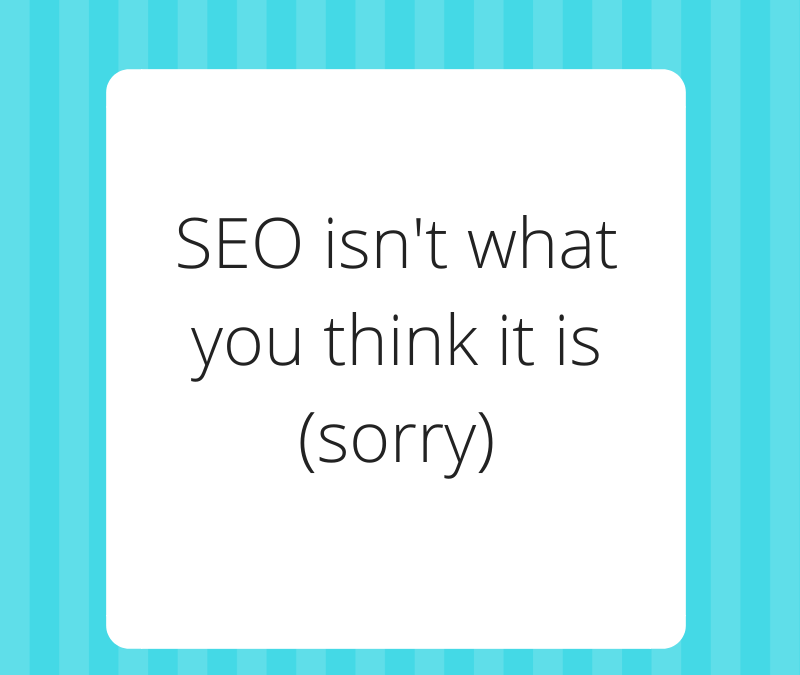Although I’m not technically an SEO pro, a lot of my work as a writer revolves around SEO. Most (if not all) of my lovely clients come to me asking for “SEO optimized content.”
The thing is, many business owners know they “need to do SEO,” but don’t understand what it is or how it actually works. You know you need it, so you hire someone to do the heavy lifting for you, right?
The issue is that, when I’m collaborating with small business owners, there’s a learning curve. As it turns out, what most people know about SEO is inaccurate. There are a lot of half-truths out there and some bad actors in the SEO space.
That means you’ve probably been fed bad information about SEO. Oh, and it also means your content is probably not SEO-optimized after all.
Yeowch.
I’m here to educate you and give you resources. If you’re running a small agency that needs results lickety-split, it’s time to learn what SEO isn’t, what it is, and what that means for all of the blogs you’ve been writing.

What people think small business SEO means
I’m more than happy to help small agencies write SEO-optimized posts. But when people hire me to write their content, they sometimes say things like:
- “SEO? Eh, we don’t really do that. Just write something good.”
- “Here’s a list of 50 keywords. I need you to have a 2% keyword density for each keyword.”
Some people are so confused/over SEO that they don’t try to optimize for it at all. If you’re doing this and aren’t sure why your organic traffic is so low … overlooking SEO is probably a contributing factor.
On the flipside, other business owners understand they need to optimize for SEO, but take it way too far. They’re stuffing in keywords into their content as fast as I stuff triple-chocolate brownies into my mouth.
I’ll touch on keywords in a sec, but the thing is, SEO isn’t about cramming as many phrases as you can into a blog. First of all, search engines can tell when you’re doing this. Second, the humans reading the blog can tell it’s just a play at ranking. Third, I bet your content will barely read in proper English, which means no one is going to stick around and read what you wrote.
The tl;dr version of this is that:
- People are cramming keywords into content and calling it SEO.
- Keywords are part of SEO, but they aren’t, by themselves, an “SEO strategy.”
- Keyword Obsession Syndrome makes for dry, bland content that no one, not even Google’s search bots, wants to read.
Let’s unpack a lot of SEO myths now, shall we?

What small business SEO actually entails
“If SEO isn’t about keywords,” you might wonder, “Then what is it actually about?”
SEO is the way search engines process information on your site. Since search engines aren’t humans, they don’t have eyeballs or human brains. That means they have to mimic the human user experience to figure out how effective your content is.
Because search engines use bots to crawl your site, they have to create metrics that help these bots “see” your website. That’s where keywords come in.
These search engine crawlers are looking at your site not necessarily for keywords, but the ideas behind the words you’re using.
I’ll say it louder one more time for the peeps in the back, because this is IMPORTANT:
SEO is about ideas, not keywords.
Now, how are search engines going to figure out what ideas are behind your content? They’re going to look at your word choice. This is why people are so dang obsessed with keywords: they think search engines are looking at certain phrases to rank your site.
This is true to an extent.

However, SEO is about semantically-related ideas, which you show to search engines through writing. But what are “semantically-related ideas”?
This blog is a good example. I’m writing about “SEO.” What ideas are commonly linked to discussions about “SEO?” Well, I’m talking about ”keywords,” “small businesses,” and “content.” Search engines can look at this blog and tell pretty quickly that I’m talking about SEO for small businesses, even if I’m not targeting the keyword phrase “SEO tips for small businesses.”
Here’s another example. If you’re writing content for a client in real estate, semantically-related concepts around real estate might include “homeownership,” “property taxes,” or “real estate agents.” Based on the ideas behind these words, search engines can figure out what the intent is behind your blog.
That’s how Google can tell the difference between a blog about “cranes” (the bird) and “cranes” (construction equipment).
What agencies need to do instead
Don’t get me wrong. I’m all for optimizing with keywords. But there’s a way to optimize your blogs for SEO without nickel-and-diming keyword counts in your content. Here’s what small agencies should do instead with their content.

1. Stop the keyword obsession
This is an easy one! The next time you find yourself wanting to stuff 50+ keywords into a 500-word blog, eat 14 bags of chips. (Salt and vinegar Lay’s are my fave)
How do you feel? Happy and satiated, or grossed-out and queasy?
There’s such thing as too much of a good thing, and that applies to both keywords and delicious chips. Sprinkle in a few keywords here and there in the content, meta details, and headers, by all means.
But keywords can’t be 80% of your content. Much like eating 14 bags of chips, it’s gross and waaaay too much.

2. Start with the idea first
What should you do instead, then? Always start with good ideas first. Nobody wants to read another “Why you should hire an agency” blog post unless it has a fun, different spin.
Once you start with the idea, choose 2-3 keywords (and semantically-related ideas) that complement that idea.
So, if you’re writing a blog about ice cream, you might choose a keyword like, “ice cream parlors in Santa Fe.” You might also choose semantically-related keywords like “summer ice cream flavors” or “ice cream cones.”
Once you’ve chosen your idea and keywords, write the piece. Make sure you use the semantically-related ideas (like “summer ice cream flavors” and “ice cream cones”) when writing the piece, but don’t focus too much on loading it full of keywords.
After you’ve written the piece, see where you can add your keywords once it’s written. I’ve found this is a great way to write good content people want to read that also ranks for SEO. You’ve written it with good information in mind; the last step is to optimize it so search engines will like you.
When in doubt, write for your human readers. Search engines are getting smarter every day. While keywords still matter, the algorithms are trying to prioritize good information and readability over keyword-stuffing. They haven’t perfectly replicated the brain of a human user, but they’re getting damn close. Future-proof your content by writing for people first.

3. Get professional help
There’s nothing wrong with getting a little help. I’m all for hiring an SEO strategist if you’ve got the cash for it, but if not, paid tools can help you, too.
Yoast is a good free tool for WordPress, although, in my opinion, it still focuses a little too much on keyword density.
MarketMuse is a good option if you want a place to check out your competitors, pick better internal links, and check your SEO health.
Clearscope is the winner in my book, though. It’s a little pricey, but it applies semantically-related concepts to your content, ensuring you’re talking about complementary ideas to both help readers and stand out to search engines.
The bottom line
SEO is really, really complex. This just scratches the surface of the complexities in SEO. I encourage you to follow resources like Moz or Search Engine Journal to stay on top of the latest and greatest in SEO. When in doubt, hire someone to manage all the fiddly SEO strategy for you. But even then, there’s value in educating yourself about what SEO is, what it isn’t, and what it can be for your business.

